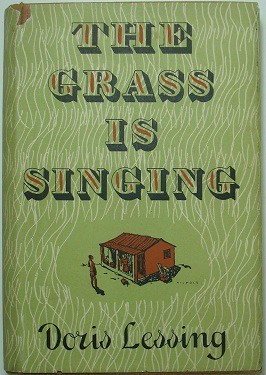The Grass is Singing

First UK edition
|
|
| Author | Doris Lessing |
|---|---|
| Country | United Kingdom |
| Language | English |
| Publisher |
Michael Joseph (UK) Thomas Y. Crowell Co. (US) |
|
Publication date
|
1950 |
| Media type | Print (hardback & paperback) |
| Pages | 256 |
The Grass Is Singing is the first novel, published in 1950, by British Nobel Prize-winning author Doris Lessing. It takes place in Southern Rhodesia (now Zimbabwe), in southern Africa, during the 1940s and deals with the racial politics between whites and blacks in that country (which was then a British Colony). The novel created a sensation when it was first published and became an instant success in Europe and the United States.
The novel begins with a newspaper clipping about the death of Mary Turner, a white woman, killed off by her black servant Moses for money. The news actually acts like an omen for other white people living in that African setting. After looking at the article, people behave as if the murder was very much expected. The bulk of the novel is a flashback of Mary Turner's life up to her murder at the hand of Moses in the last chapter.
Mary has a content life as a single white Rhodesian (we assume, though the novel refers to both Rhodesia and the Union of South Africa simply as South Africa, while making clear the farm is in Southern Rhodesia) woman. She has a fine job, numerous friends, and values her independence. Nevertheless, after overhearing an insulting remark at a party about her spinsterhood, she resolves to marry.
The man she marries, after a brief courtship, Dick Turner, is a white farmer struggling to make his farm profitable. She moves with him to his farm and supports the house, while Dick manages the labour of the farm. Dick and Mary are somewhat cold and distant from each other but are committed to their marriage. Dick and Mary live together an apolitical life mired in poverty. When Dick gets sick Mary takes over the management of the farm and rages at the incompetence of her husband's farm practice. To Mary, the farm exists only to make money, while Dick goes about farming in a more idealistic way.
Mary and Dick live a solitary life together. Because of their poverty Dick refuses to give Mary a child. They do not attend social events, yet are a great topic of interest among their neighbours. Mary feels an intimate connection with the nature around her, though being in general rather unexplorative in nature.
Mary is overtly racist, believing that whites should be masters over the native blacks. Dick and Mary both often complain about the lack of work ethic among the natives that work on their farm. While Dick is rarely cruel to the workers that work for them, Mary is quite cruel. She treats herself as their master and superior. She shows contempt for the natives and finds them disgusting and animal-like. Mary is cross, queenly, and overtly hostile to the many house servants she has over the years. When Mary oversees the farm labour she is much more repressive than Dick had ever been. She lets them work harder, reduces their break time, and arbitrarily takes money from their pay. Her hatred of natives results in her whipping the face of a worker because he speaks to her in English, telling her he stopped work for a drink of water.
...
Wikipedia
